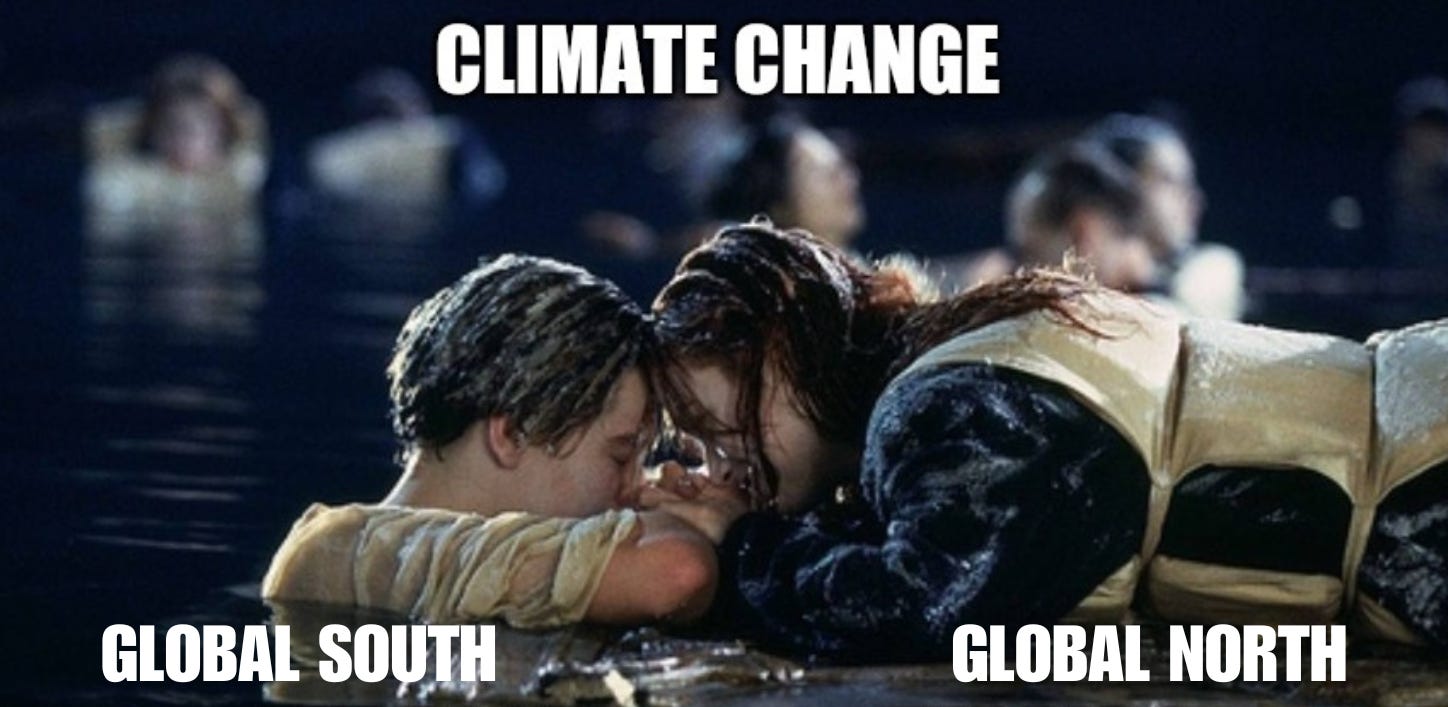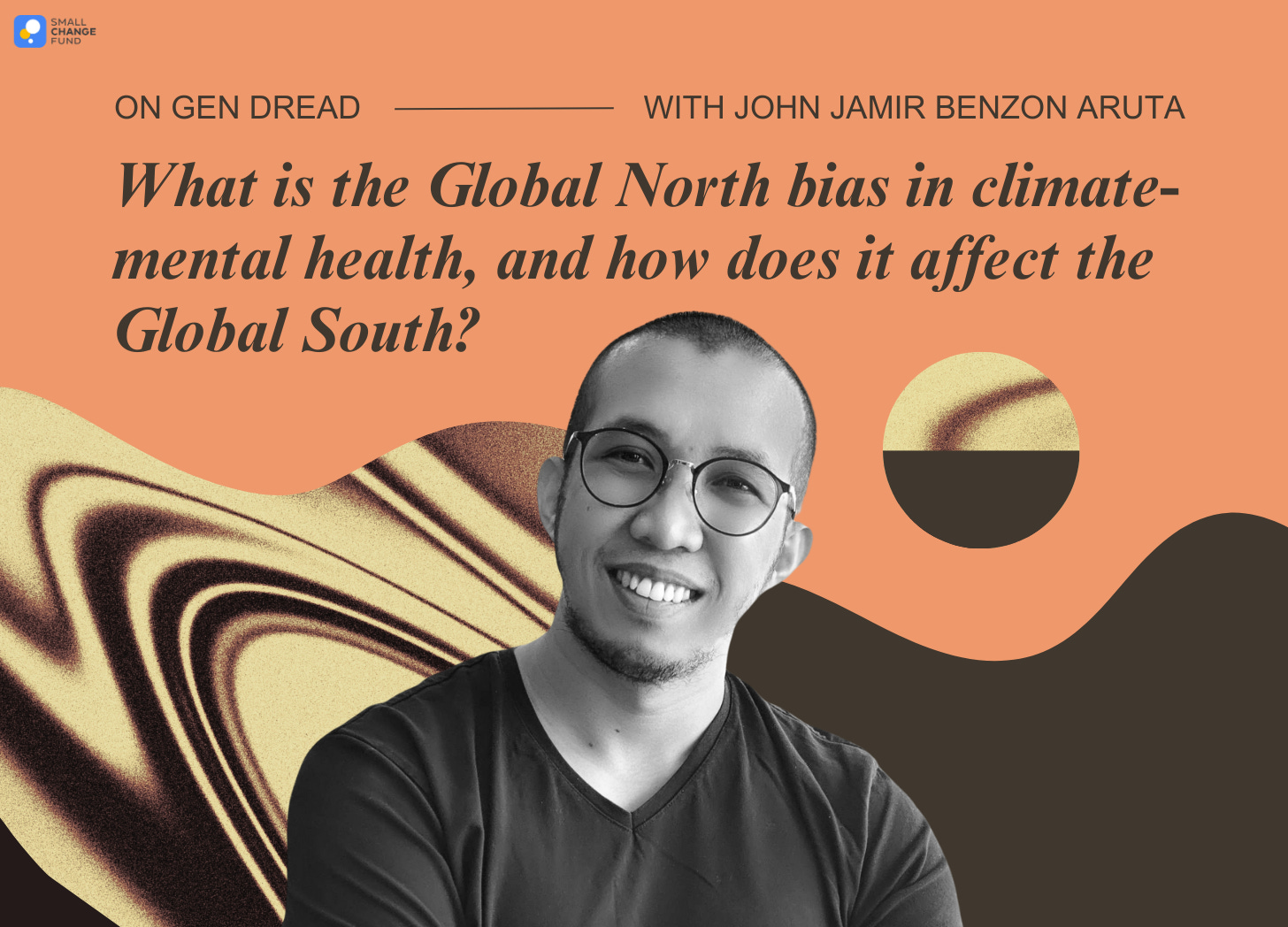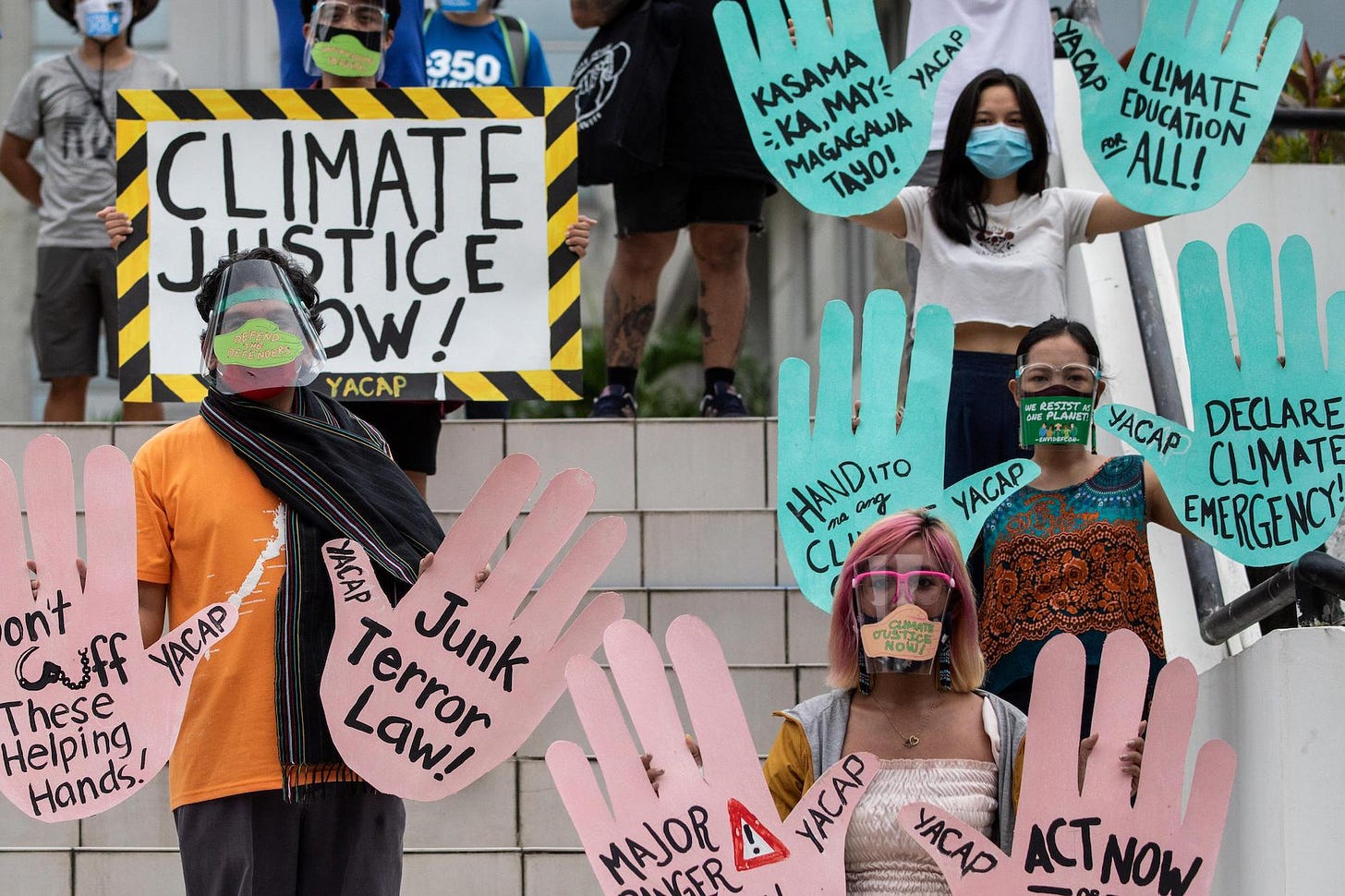What is the Global North bias in climate-mental health, and how does it affect the Global South?
John Jamir Benzon Aruta explains the concentric circles of injustice some people in the Global South are feeling
When it comes to the climate crisis, and certainly the even newer realm of climate and mental health, countries in the Global North tend to do most of the talking. John Jamir Benzon Aruta is a psychology and sustainability professor at De La Salle University in Manila, Philippines. And he’s done a lot of work exploring the multiple layers of climate injustice – moral, economic, emotional, psychological, and logistical – that people in the Global South experience as a result. We had the pleasure of sitting down with John and, this time, gladly inviting the wise perspective he represents as a leader and educator in the Global South to steer the conversation.
What is the Global North bias and how does it show up in the realm of climate change and mental health?
The number of publications in climate change and mental health are predominantly coming from the Global North. And most of the funding supports studies in the Global North. But also, in terms of actual mental health consequences from climate change, we know that Global South populations are facing the worst consequences, and especially for vulnerable and marginalized communities, those consequences are amplified. When typhoons happen, when drought happens, or here in the Philippines, as we experienced recently, heat waves – on average, the heat index we experience is between 45 degrees and 53 degrees Celsius – the most vulnerable are suffering the most in terms of number of deaths, in terms of mental health impacts triggered or exacerbated by heat. Yet the reality surrounding this is that Global South countries did not cause climate change historically or currently.
So that’s where the bias and the injustice is coming from. It’s mostly a systemic, infrastructural issue. Many of the competitive universities that have a history of completing projects are based in the Global North. And the resources are coming from the Global North. Every now and then, you see funding focusing on the Global South, but primarily this funding is still going to the Global North or managed by people in the Global North, even if their work is conducted in the Global South. Meanwhile, many of the universities and institutions in the Global South lack the capacity and resources to manage big projects. So, for example, if I as a scholar from the Global South apply for funding, most of this funding requires that the Principal Investigator comes from somewhere in the Global North, and I would be some kind of “country collaborator.”
What can the Global North learn from the Global South in terms of climate and mental health?
Many times you hear Global North scholars, policymakers, and experts saying they will help the Global South, like a messianic kind of perspective. That they are here to help the Global South. That they have the technology and they have the knowledge. As if the Global South knows nothing. I just attended a conference last month in Beijing, and there was a scholar from Yale University who literally said this. It was kind of sad because it does not acknowledge that in the Global South, for the longest time, we have been experiencing climate change and we have generated practical knowledge that we sometimes infuse with our Indigenous and traditional knowledge to address the impacts of climate change. Many of the Global South populations may not know the term “climate change” but they know the changes, the floods, the heat. And they have been dealing with climate change-related events at a low budget, pretty effectively. But now that the Global North begins to experience increased heat or flooding, you can learn so much from those countries in the Global South. I'm not saying that we should be the source of knowledge, but there should be a healthy knowledge exchange between the Global South and the Global North. That will only happen if our friends and colleagues stop thinking in terms of that messianic savior complex they love.
How is the Global South handling the psychological effects of climate change?
This is a very, very new space. Often if you look on the ground, people don't know the connection. But in my work, I've talked to Indigenous people about their experience with mental health consequences due to environmental decline, and they have Indigenous and traditional rituals that they engage in to manage all these negative emotions of the experience, to deal with sadness and grief. And they find peace by engaging in these rituals and traditions. They reconnect with nature and with their ancestors, for instance.
In terms of dealing with mental health problems on the ground, the ratio between mental health professionals and the overall population is a big problem. There are only around 4,000 psychologists and guidance counselors, versus the population of 110 million. So we draw from grassroots efforts to train people and organizations in mental health first aid. They can at the very least detect those members of the communities with problems and provide basic necessities like food, water, safety, and make sure that people are taken care of at that level. We draw so much from grassroots communities in the Philippines, and it can be very, very effective because communities are very collective and everybody knows everybody. And often they wouldn't ask for funding because they know there's not much resources, but they do draw from their collective interest and they draw from their sense of community to volunteer.
But there's another complexity as well: the Philippines is the deadliest country for climate and environmental activists. So while we say, “oh, you need to engage in climate activism and fight for your future, fight against those feelings of despair,” if you do that, you literally can die. We have the most number of climate activists and environmental activists killed by political and commercial drivers. Even I have to be quite careful. I have personally experienced being surveyed because of doing this work.
Do you see a way forward in terms of getting people the mental health support they need?
If we see real and urgent action from leaders from the rich countries who cause climate change, we might feel some hope. At the moment, it's normal for people in the Global South to feel helpless because we can't do anything about mitigation. We are not causing climate change. So our lives depend on how much action and how urgent the action is in the Global North.
But climate justice is gender justice as well. Females experience the worst consequences of things when shit happens. When disasters happen, when there's drought, when there's poverty, females are exposed to gender and sexual violence at home and outside. Also, in terms of access, when it's time to recover, females still are disadvantaged. They don't have access to land. Land usually goes to men. Females usually depend on men financially and economically. And in the Philippines, the distance between the rich and the poor is very wide. I know in the U.S. it's wide too. But being poor in a poor country is just different. Being poor in a poor country means you really have nothing. People are forced to live in dangerous places, exposed to elements and chemicals and therefore exposed to serious mental health consequences. And they're also the same people who don't have access to healthcare. Or mental healthcare. So that's another layer of injustice.
When we talk about mental health consequences in the Global South, it's not simply depression, anxiety, and trauma – there's so much complexity in the emotions: feeling betrayed, feeling angry, frustrated, and these emotions are coming from your moral domain. When equality is violated, when your morality is violated, you feel these emotions. So mental health consequences in the Global South also involve a real feeling of abandonment because we're suffering the worst of it, the loss and damages, but the resources and funds don't come. And we didn't cause it. So it's infuriating.
If you liked reading this, feel free to click the ❤️ button on this post so more people can discover it on Substack 🙏🏼
Making Waves
From one of the world’s leading climate scientists, Into the Clear Blue Sky is a heart- and mind-changing book that offers a hopeful and attainable vision for how we can restore the atmosphere in our lifetime—and why this should be our moral duty.
The Educator's Guide to Climate Emotions is complete! Written by a team of teachers, researchers, and mental health clinicians in consultation with youth climate leaders and climate psychology professionals, it offers a variety of approaches for working with climate emotions in educational settings. And the much loved and widely used Climate Emotions Wheel is now available in 15 languages! Care of Climate Mental Health Network.
Researchers at the University of Waikato in New Zealand are in the process of developing a new self-report measure aimed at assessing climate anxiety in a variety of settings, including psychotherapy and other mental health-related contexts. They are seeking feedback from people working in clinical psychology, the mental health field, and other areas of psychology that are interested in providing input in a survey. If you would like to participate, please visit here. If you have any questions, email: tomasoomgago@gmail.com.
Pssssst, beloved reader: while you’ve got sustainability on your mind, we’d be so grateful if you’d take a sec to consider joining the community of folks whose generous donations power our work. The more people who are able to donate, the more mileage the Gen Dread team gets and the more we can commit to what we do long-term. If you’re able, you can either become a paid subscriber or support us with a one-time donation through our partner, Small Change Fund. Thank you, truly, for giving it some thought.
‘Till next time!








Super post and a critical perspective. The Global North should give the reins to the South and let it lead. It has the ancestral knowledge and practical solutions. *And* it already mostly has the community-first mindset that we must adopt in the North if we're to survive this crisis.
Thank you for this perspective John Jamir Aruta, stated so simply and elegantly. Not easy subject matter but foundational points about the global North narrative that pertains across so much of the environmental landscape, even in relation to categorising emotions as you say. Good to see Indigenous responses, that are vastly different to Western psychology, gaining exposure. Also value your foregrounding the intrinsic nature of community in global South settings, often interpreted through an individualised global North lens. We need more voices like yours to change the dialogue, the questions, the narrative, and we need funders to hear and register the difference to undo the damaging inheritance of colonial power relations. Much appreciation.